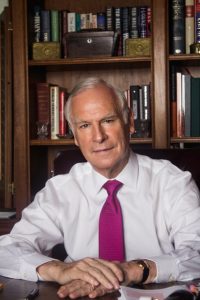For about one-fifth of all Americans, life is as good as it gets. For the other four-fifths — the majority of America — life is pretty miserable. So said Chautauquan Peter Andrew Georgescu, who, having himself experienced a fearful and harrowing childhood in Eastern Europe, can empathize.

In April 1954, at the age of 15 and with at best a second-grade education, Georgescu arrived in New York as an undernourished refugee unable to communicate in English. Over time, he developed a career as a national and international business strategist with a keen interest in the creative process, including innovative research, development and communications and compensation-related programs.
At 9:15 a.m. on Thursday, Aug. 2, Georgescu will give a talk titled “Capitalists, Arise!” at the Chautauqua Women’s Club as part of its Chautauqua Speaks series.
His talk title is based on his third book, written with David Dorsey, Capitalists Arise!: End Economic Inequality, Grow the Middle Class, Heal the Nation, and his New York Times article, “Capitalists, Arise: We Need to Deal With Income Inequality.”
“I’m scared,” Georgescu wrote in the Times. “The billionaire hedge funder Paul Tudor Jones is scared. My friend Ken Langone, a founder of the Home Depot, is scared. So are many other chief executives. … We are afraid (of) where income inequality will lead.”
He wrote that even after paying the bills, people at the “higher end of the middle class have relatively little.”
“If inequality is not addressed, the income gap will most likely be resolved in one of two ways: by major social unrest or through oppressive taxes,” Georgescu said.
Georgescu was born in Bucharest on the eve of World War II and taken with his elder brother, Constantin (Costa), to live with their maternal grandparents in relative safety in their Transylvanian villa. When the Iron Curtain fell in 1947, he was 7. Both boys were separated from their parents, who happened to be in New York on business.
Their grandfather, a former regional governor, was imprisoned as a potential insurgent and murdered.
Along with his brother and grandmother, Georgescu was arrested and forced to endure extreme hardship in a labor camp.
Eight years later, he and Costa were swapped for Soviet spies. Their father — who had been imprisoned by the Nazis during WWII and was managing the Romanian Ploesti Oil fields (Europe’s richest) in 1946 — had notified the press that Romanian communist diplomats in New York had threatened the lives of his children. Congresswoman Frances Bolton and President Dwight Eisenhower intervened in 1954, and the boys were reunited with their parents.
Persevering in spite of the deprivation of his youth, Georgescu earned degrees from Exeter, Princeton and Stanford Business School. As he worked his way up to become chair and CEO at the public relations firm Young & Rubicam — where he is currently chair emeritus — he also worked his way into the ranks of the 20 percent of Americans living the good life.
When it comes to “declaring victory after 4.1 percent GDP growth,” Georgescu said, referring to President Donald Trump’s response to the federal Department of Commerce’s news last Friday, July 27, “the gross domestic product measures the ability of 20 percent of Americans to thrive. Most of the other Americans don’t contribute to it at all.”
Georgescu has never forgotten the atrocities of fascism and communism during his childhood. In his second book, The Constant Choice: An Everyday Journey From Evil Toward Good, he makes a plea for more compassion and consideration, and less self-preservation and aggrandizement at all costs. He urges individuals and businesses to opt for good over evil on a choice-by-choice basis.
“The changing nature of work is not the issue,” Georgescu said. “We’re worrying about robots and technology; (that’s) not the issue. … I’m going to talk … about the single most important issue in America today from every aspect. From an economic aspect, from a national security aspect, from the future of democracy aspect.”
He said this not just an important issue; it’s an existential issue.
“And the issue is the inequality of income, which drives inequality of opportunity,” Georgescu said. “That’s the problem today. And it’s hidden in plain sight. It is totally hidden. It’s hidden by denial, it’s hidden by ignorance, and it’s hidden by deliberate intent.”
According to Georgescu, the best way to think about inequality is literally, not metaphorically.
“There are two Americas,” Georgescu said. “And they split close to 80/20.”




